Julija Cukovic, born with Apert Syndrome, to undergo life-changing surgery at the Australian Craniofacial Unit
AN operation to change the life of little Julija Cukovic, who was born with a rare genetic disorder, is the Australian Craniofacial Unit’s toughest challenge yet.
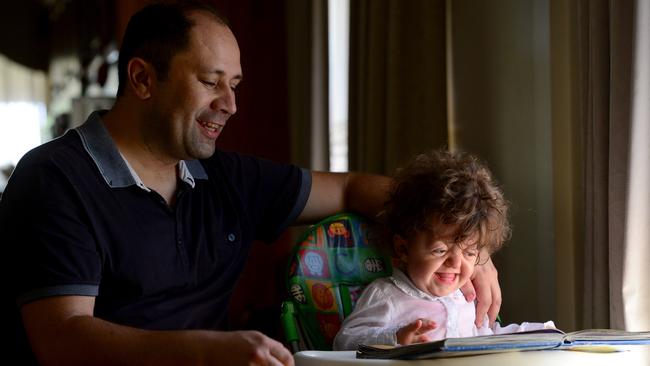
National
Don't miss out on the headlines from National. Followed categories will be added to My News.
AN operation to change the life of little Julija Cukovic is the Australian Craniofacial Unit’s toughest challenge yet.
Born in Kragujevac, a town 120km south east of Belgrade, Julija, who turns three on Tuesday, is in Adelaide to have life-changing surgery at the world famous unit.
Julija lives with Apert Syndrome, a rare genetic disorder that causes vision, hearing and breathing problems as well as slow development as a result of being born with distorted skull bones.
She also has webbed hands and feet and struggles to eat because she can’t chew properly.
Medical veteran Professor David David will lead the complex surgery next week and says the procedure is “as hard as it gets”.
Who is Julija?
JULIJA was loved fiercely long before she entered the world.
An IVF baby, she was born in Serbia to proud parents Ivica and Jasmina Cukovic.
As she sits playing happily on the floor, Julija is not unlike any other toddler.
But the three-year-old was born with a rare genetic disorder called Apert Syndrome.
Babies with the syndrome have fused skull bones, when usually the bones join together over time.
Because these children are born with a misshapen head, it means they have vision, hearing, breathing and eating problems as well as slow development.
They also often have webbed hands and feet.
Julija doesn’t know it yet, but she’s got a team of experts working behind her to ensure her life is the very best it can be.
She is in Adelaide with her father and Auntie Katica, while her pregnant mother Jasmina holds the fort back home.
Mr Cukovic is clearly proud of his daughter given everything she’s been through.
“She’s a fighter,” he said.
“Even with everything she’s been through, she’s still got a happy nature — she gives us strength to carry on.”
Julija will celebrate her birthday with family today before her big operation next Tuesday.
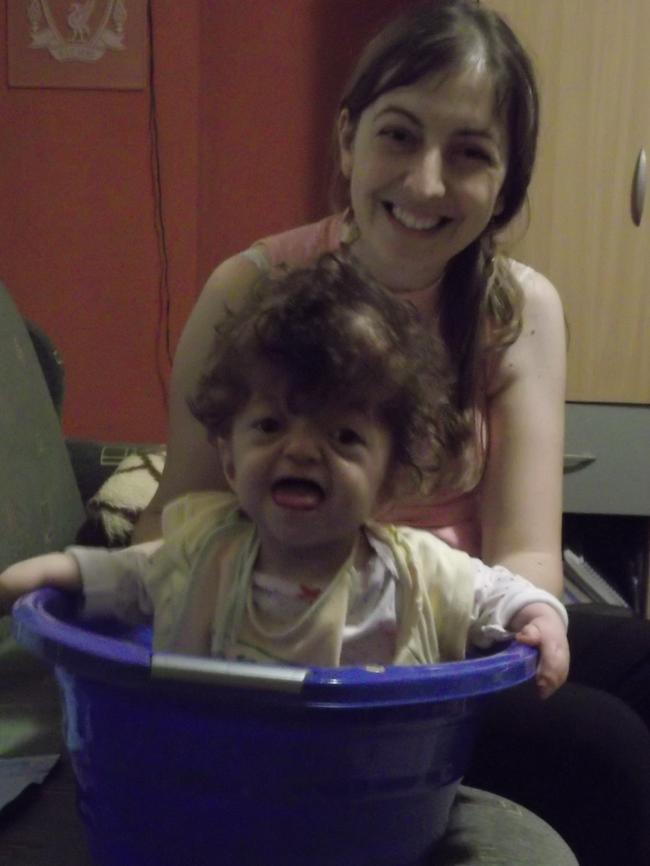
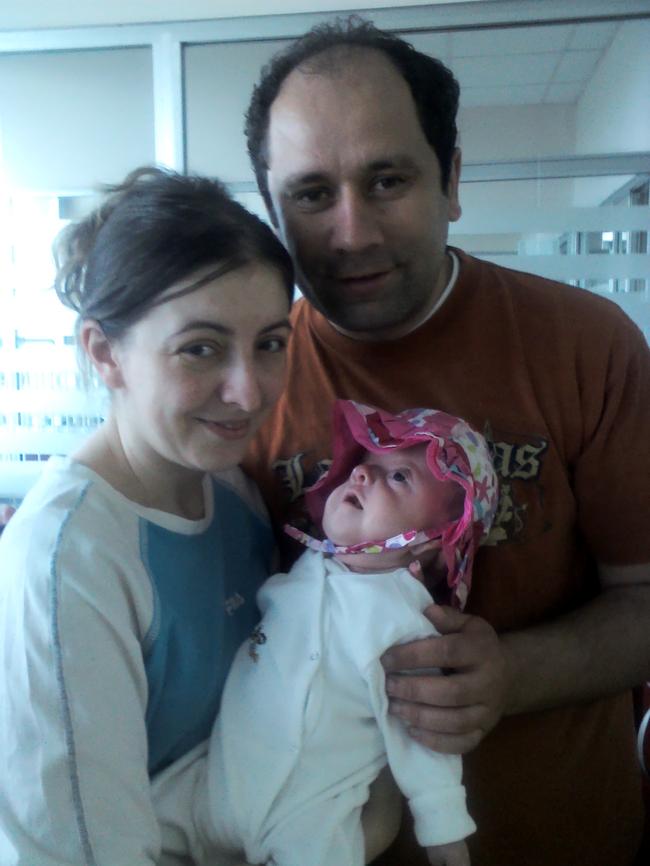
Why Adelaide?
A STRONG Adelaide connection was what brought little Julija across thousands of kilometres to South Australia for life-changing treatment.
Relative Jim Filipovic, of Newton, met Julija for the first time while on holiday in Serbia last year.
“We started talking about all of the problems they (the family) were having and what the issues were and I made a phone call when I got home,” he said.
Upon returning home, Mr Filipovic inquired if Julija could have surgery at the Craniofacial Unit.
“I didn’t know too much about it (the unit) but I knew they were bringing kids over from overseas for this type of treatment,” he said.
“I made a phone call and they told me ‘I think Julija’s got a pretty good chance, can you get me as much information (about her) as you can on paper?’
“I then got a phonecall saying Professor David David had looked at the report and he was happy to get her over as quick as possible.”
Supported by private fundraising efforts and the unit, the family was told Julija could come to Adelaide for surgery.
They arrived in November last year, just a few months after the initial phone call.
Julija is one of more than 17,000 patients from across Australia — and the world — the unit has treated in its 40-year history.

Treatment so far
THE last few years have been tough for the Cukovic family.
Julija’s parents Ivica and Jasmina Cukovic have ferried their daughter across Serbia for various specialist appointments — and surgeries — to ensure she gets the very best treatment possible.
She has already endured three operations in Serbia and one in Adelaide, and will undergo another two — including the major one on her skull — before she goes home.
“The first operation in Serbia was on her head at two and a half months, then at 12 months they put a shunt to drain fluid from around her brain and in April last year, she had one of her fingers separated,” Mr Cukovic said.
Since arriving in Adelaide in early November, Julija has already had 30 specialist appointments.
She has seen everyone from respiratory, eye and hearing doctors, physiotherapists and a neuro surgeon.
In December, she had surgery at the Women’s and Children’s Hospital to widen her cleft pallet which improved her breathing and her tonsils and adenoids were also removed.
The major operation to reshape her skull and head is scheduled next Tuesday.
A final operation, likely in March, will separate her fingers.
The operation
PROFESSOR David David admits Julija’s operation is “as hard as it gets”.
“It will be very hard ... it’s a very severe deformity,” he said, adding the surgery will begin at 8am and take until 2pm to complete.
Prof David, 74, will lead the painstakingly tough operation to reshape Julija’s skull and bring her head forward.
“The operation will enable her brain to grow properly and will protect her eyes,” he said.
The medical veteran will work alongside a team of the state’s top medical professionals including nurses, an anaesthetist, neurosurgeon and craniofacial surgeons.
The surgery is made more difficult because Julija already had the operation in Serbia, but it was unsuccessful.
“Dealing with the brain is always a risky business — but it’s what brain surgeons do,” Prof David said.
“The skull will have to be reshaped so there’s more room for the brain so the brow covers the eyes because at the moment her eyes are popping out of her head.
“This is not a cosmetic operation — it is all about her development.”
Prof David said the Australian Craniofacial Unit, which is based at the Women’s and Children’s Hospital, treated about 15 or 20 international patients with severe deformities like Julija’s every year.
“We take patients from all over Australia, South East Asia and beyond,” he said.
“The State Government gives support to very poor people from overseas.”
Over its 40-year history, the unit has managed more than 170 patients with Apert Syndrome — more than any unit in the world.
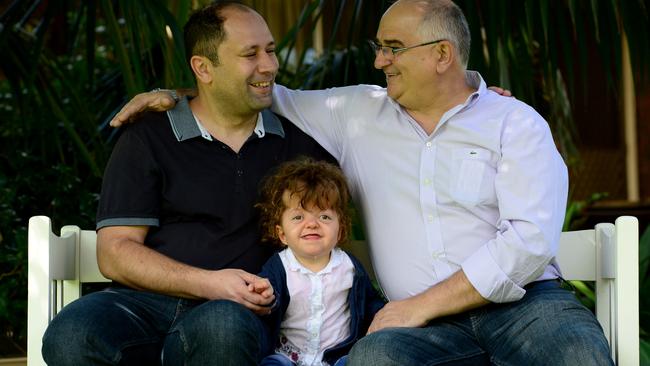
The lifelong fight
JULIJA’S fight for a “normal” life does not stop here in Adelaide.
It requires years of follow up treatment and further surgery in her teenage years.
“These children need management from birth to maturity and it needs to be done in places that do the work frequently (like Adelaide),” Prof David said.
Prof David said Julija — like many people with Apert Syndrome — could live a normal life.
“We’ve been able to look at babies and trace them through to adulthood and determine exactly how they turn out,” he said.
“It was always thought that these babies were going to be permanently behind but if they’re managed properly, a considerable portion of them will be almost normal.
“They can go to school, some go to university and many of them hold down good jobs — it could be Julija.”
Prof David said a cure did not come from “just a single operation”.
“It is a program of management over many years ... Julija needs follow up management (with) her breathing, her eyes, her ability to speak properly and speech therapy,” he said.
“We will arrange this as best we can with the local people in her country.”
Julija will need surgical intervention in her teenage years to bring her face forward.
“(People with Apert Syndrome) are never going to look perfect and some of them are never going to function as well as normal people,” Prof David said.
“Give them every opportunity and the majority of them will.”
While Julija is too young to realise it now, no one is more grateful for the unit’s help than her family.
“We’re very happy we’ve been given the opportunity to have this and to know Julija will be better soon and start to see the results,” Mr Cukovic said.
“We have in the back of our minds this is not the end of the journey, there’s still a lot more to do with more operations further down the track.”
What is Apert syndrome?
■ A rare genetic disorder that causes vision, hearing and breathing problems as well as slow development as a result of being born with fused skull bones.
■ Prevents the skull from growing normally and babies are born with a distorted head and face.
■ As a result, many children have webbed toes and feet.
■ Only one parent needs to have an abnormal gene for the child to inherit the disease.
■ It is estimated Apert syndrome occurs in one in 45,000 to one in 160,000 babies.
■ With correct, early intervention and successful surgeries, children with Apert syndrome can grow up to live a normal life.
Who is Professor David David?
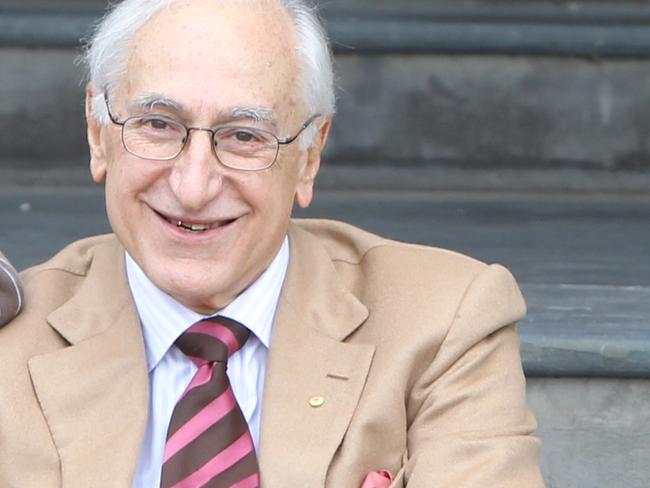
UTTER Professor David David’s name in medical circles across Adelaide, Australia and the world and you know you’re in safe hands.
The 74-year-old medical veteran heads the Australian Craniofacial Unit based at the Women’s and Children’s Hospital in Adelaide.
Since he set up the unit in 1975, Prof David has helped tens of thousands of people with cranio-facial deformities.
Working alongside a team of the state’s top medical professionals, Prof David continues his innovative work in developing new treatments, tools, research and systems to restore dignity to his patients, who come to see him from across Australia and around the world.
Born in Adelaide, Prof David specialises in the area of craniomaxillofacial surgery and plastic and reconstructive surgery of the head and neck.
In recognition of his work he
received the Companion of the Order of Australia in 1988 and in 1990 he was named South
Australian of the Decade.
Prof David continues to teach future craniofacial surgeons who come to Adelaide to gain his
expertise from as far away as
Britain.
Originally published as Julija Cukovic, born with Apert Syndrome, to undergo life-changing surgery at the Australian Craniofacial Unit


